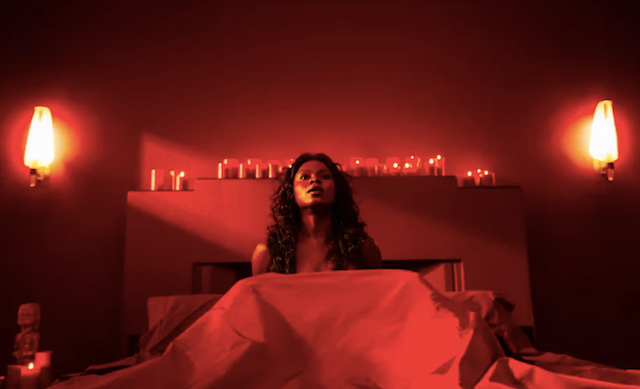We Need to Talk About the First Episode of American Gods


Rejoice, o TV watchers, for the American Gods debut has descended upon the people. I’ve been waiting a month to talk to you all about the show, so let’s do this.
I have to start by saying that the first episode is incredibly ambitious and has to cover a lot of ground while also introducing a strange new world to viewers who have never heard of Neil Gaiman’s novel. Of the four episodes I’ve seen, it might be the most unwieldy, but it’s certainly provocative—and effective. Starz has been blanketing the nation with advertisements and the show received pretty ecstatic reviews across the board, so I’m certain a large, curious viewing audience was watching. Whether they were prepared for what they saw is another matter.
As I said in my initial yelling about the series before I was allowed to talk about spoiler-y specific elements, American Gods is like nothing you’ve ever seen before. Bryan Fuller’s famous aesthetics are on point (along with the comic book sensibilities of co-showrunner Michael Green), and in the first episode, the visuals are absolutely one of the best elements. The way a scene is shot can build dread and wonder from nothing more than the camera’s positioning: think about Shadow packing up the house he shared with Laura, and all the while the box with her personal effects is looming over him and all of us like a weight we can feel. The colors, costuming, sets and settings are evocative and transporting. I want nothing more to drink at the crocodile bar.
I love the casting and think the acting is top-notch. Ian McShane is Mr. Wednesday, and his charisma carries the show to new heights (insert joke about ravens here). Ricky Whittle has the hardest job as Shadow, present in so many scenes but having to stay the stoic straight man while Gods and monstrous beings romp around him. I think Whittle does an excellent job of playing a much-suffering, much-tortured protagonist with a backbone of steel.
Of course, social media and articles today are alight with the jaw-dropping, did-that-really-happen moments I was expecting: namely, the holy-shit-they-went-there-they-actually-did-it scenes with goddess of love Bilquis, and the last, violently shocking cliffhanger that the episode ends on. As I said previously, “This is a show that knows that its star is a black man in contemporary America,” and rest assured, next week’s episode addresses the fraught symbolism of what happened. But that moment was, for me, extremely difficult to watch. (The next episode’s opening “Coming to America” scene is some of the finest television I’ve ever seen.)
I’ll be quiet now and turn over the soapbox because I’m dying to know what you thought. Did anything surprise you? Annoy you? Dazzle you? Which Gods are you waiting to see? Did you love the episode or not know what to do with it? Are you ready to follow Mr. Wednesday into war? SO MANY QUESTIONS.
(image: Starz)
Want more stories like this? Become a subscriber and support the site!
—The Mary Sue has a strict comment policy that forbids, but is not limited to, personal insults toward anyone, hate speech, and trolling.—
Have a tip we should know? [email protected]
